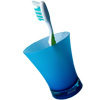How to keep your ‘two front teeth’ (and all the rest) this Christmas
The Australian Medical Association (AMA) and the Australian Dental Association (ADA) have joined forces to heighten community awareness of the importance of dental care as part of overall personal health and wellbeing.
Doctors and dentists are specifically reminding people about the dangers of excess sugar consumption over the holidays.
AMA President, Dr Steve Hambleton, said today that most people, including children, increase their consumption of sugary foods and drinks over Christmas and the holiday season.
“Sugary foods and drinks are nice to have occasionally, but it’s important to remember only to consume them on special occasions, and not to include them as part of your regular diet,” Dr Hambleton said.
“While these foods and drinks provide excess calories, they have a detrimental impact on dental health and can also have an impact on a person’s physical health.
“Poor diet is one of the major contributors to tooth erosion, with soft drink and fruit juice being very significant.
“Sugary foods, such as sweets and lollies, fruit snack bars, sugary soft drinks and juices, all contribute to dental decay as sugar feeds the destructive bacteria in the mouth, which then puts acid on teeth.”
ADA President, Dr Shane Fryer, said that refined foods such as crackers and chips might also have a high carbohydrate or sugar content.
“For example, a 600ml bottle of soft drink can contain up to 13 teaspoons of sugar,” Dr Fryer said.
“Sugary beverages such as soft drinks, sports drinks, energy drinks, fruit juices and cordials may also be high in acid, which can have an erosive effect on teeth.
“Consumption of these drinks should be limited, but drinking water is the best option.”
Background:
- Recently released Australian research has confirmed that consumption of high levels of soft drink is positively associated with asthma and chronic obstructive pulmonary disease (COPD) in adults – 13 per cent (of the 16,000 South Australian participants) with asthma and 15 per cent of those with COPD reported consuming more than half a litre of soft drink per day – those consuming more than half a litre per day had a much higher prevalence of asthma and a significant increase of COPD [Respirology 5 Dec 2011].
- For children, foods such as cheese and nuts are better snacks for dental health – these should all be consumed in moderation and washed down with water.
- While it may be difficult to cut out sugary foods, snacks and soft drinks, ideally they should only be consumed occasionally and it is important that good oral hygiene practices are followed – daily flossing and brushing reduces the risk of tooth decay.
- Data from the Australian Institute of Health and Welfare suggest that 40 per cent of 4-5 year olds and 60 per cent of 6-8 year olds in Australia have caries in their deciduous teeth, and that 58 per cent of 15 year olds have caries in their permanent teeth.
(Source: Australian Medical Association (AMA))
More information
 | For more information on dental health in children, including teething, hygiene and nutrition for good teeth, as well as the importance of dental check-ups, see Dental Health in Children. |
Dates
Created by:

 Login
Login














